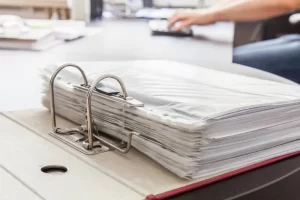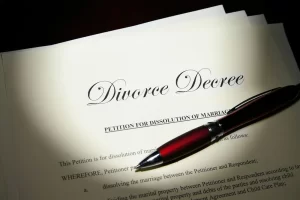What Information is Found in Divorce Related Documents, their Purpose, and the Process for Obtaining Divorce Records in NJ
 If you divorce in New Jersey, you soon understand how paper-intensive the process is from beginning to end. There is paperwork to fill out before, during, and after the divorce proceeds through the family court system. But the parties to a divorce, or dissolution, do not file all paperwork with the Superior Court, Family Division. Only certain documents become part of the court’s file.
If you divorce in New Jersey, you soon understand how paper-intensive the process is from beginning to end. There is paperwork to fill out before, during, and after the divorce proceeds through the family court system. But the parties to a divorce, or dissolution, do not file all paperwork with the Superior Court, Family Division. Only certain documents become part of the court’s file.
Contact the experienced divorce lawyers at The Montanari Law Group to seek legal assistance regarding your divorce documents in New Jersey. Call 973-233-4396 to schedule a free consultation with a member of our team.
Documents Included in Divorce Records
Divorce records are those you can find in a court file. They include the Complaint for Divorce and Summons that begin the dissolution case and all other filed documents and transcripts detailing the divorce from beginning to end. A spouse who wants to divorce files the Complaint and Summons with the county superior court where they live, which means a court clerk records the documents with the date and other information and opens a file where all other divorce records go when filed. With an attorney, a spouse may electronically file divorce documents.
Each document filed with the court is a divorce record. Such documents may include financial forms supporting child support applications, marital agreements, and divorce decrees. Some court records contain confidential information, such as spouses’ names, addresses, children’s names, and financial information. To safeguard personal information, the court is selective about releasing divorce records to the public.
Difference Between a Divorce Certificate and a Divorce Decree
Divorce Certificate
One record, a divorce certificate, is a final divorce document stating the essential statistical facts of a divorce. It includes the names of the parties, the date when the divorce was final, and where it was finalized. It contains no details of the parties’ agreement regarding property division, custody, or support. For example, the certificate verifies a divorce, which may be necessary for name changes post-dissolution. The certificate signals the ending of the divorce process. The document is accessible to the divorcing parties, but the general public must get approval and pay a fee to obtain the certificate.
Divorce Decree
On the other hand, a divorce decree documents all the issues decided in a divorce, whether by agreement or trial. It is the court’s order concerning all the divorce issues. So, it may include the marital agreement to matters such as the child custody arrangement between the parties, alimony, and property division. The divorce decree is the law of the divorce the parties must follow and is accessible in the Records Center of the Superior Court or online.
Divorce Records and the Public Eye
Though divorce records are accessible to the divorcing parties, the public must apply to the County Clerk of the Superior Court or the Superior Court of New Jersey Records Center of the Court Clerk of the court where the divorce took place to view records. The courts may keep some information from the public. For example, documents may exclude sensitive details about domestic violence and children. The Records Center holds older, archived records. The County Superior Court website contains the records request forms. Superior Court websites, third-party, public record sites, or government public website searches may turn up divorce records, but only sometimes. Most require a fee.
Reasons Parties May Need Access to Divorce Documents
Parties to a divorce may need copies of the divorce decree for many reasons. A spouse wishing to change their name back to their maiden name may need a divorce decree. Refinancing home mortgages may also require proof of a party’s divorce and for insurance and other financial and legal matters. More importantly, divorce records affect legal proceedings in bankruptcy, probate, and civil courts. Creditors in bankruptcy or civil collection lawsuits may want proof that a spouse is not a co-debtor post-divorce or that a spouse is no longer a beneficiary to inherit property due to divorce. And the public may want to know whether the person they intend to marry is divorced or still married.
Information Included in Divorce Records in NJ
Since divorce records contain important dates about the commencement and finalization of divorce and the start and end dates of child custody and visitation arrangements, they are critical for evidentiary matters in other cases. They supply proof that actions occurred. For example, parties who wish to modify their child custody or support must have the divorce decree to prove enough time passed to warrant a custodial change or support modification. It also contains transcripts of hearings parties attended regarding the matters in the divorce. The transcripts contain what the parties, attorneys, and judge said at the hearings. Those may be important to clarify a later dispute about interpreting an order in the divorce decree.
 Costs to Obtain Different Divorce Documents
Costs to Obtain Different Divorce Documents
Unfortunately, transcripts and other records cost money to obtain. The cost of record copies is $10 per record, but certified copies may be more, such as $15.00 per record. A certified copy of a final divorce decree is $25.00. An exemplified copy, which is a divorce record authenticated by the attestation of the clerk and seal of the court, is $50.00 on top of the regular per-record fee. And court reporters charge fees to duplicate transcripts at $4.25 to $7.25 a transcript, depending on the length and turnaround time to complete them.
Contact New Jersey Divorce Attorneys for Additional Assistance Locating and Using Your Divorce Record
Regardless of your need for divorce records, you may want the help of a family law attorney. It is often easier for an attorney to access electronic records through the Superior Court or the Records Center. They know their way around the court system better and, so, know the most expedited route to get you what you need. Even if you did not have an attorney during the divorce, you could still use one to obtain documents or to represent you in court matters for which you are getting the documents. For instance, a support or custody modification involves filing the proper documents, making the most persuasive argument, and advocating for the most advantageous outcome for the client. You may need court records, transcripts, and orders in the court file. It can be complicated, but an experienced family lawyer knows what you need to prove your case.
If you need to access and copy your divorce records or you have a case that requires these essential court files, contact a family lawyer at The Montanari Law Group to help you. Our attorneys handle divorces and other cases in family court on a regular basis, prioritizing our client’s goals and coming up with individualized solutions to best achieve their desired ends in Paramus, Bergenfield, Montvale, Hawthorne, Fort Lee, or other nearby towns in Passaic County, Essex County, Bergen County, and North New Jersey. Contact 973-233-4396 or complete our online form to set up a time to talk to a lawyer in a free consultation.

